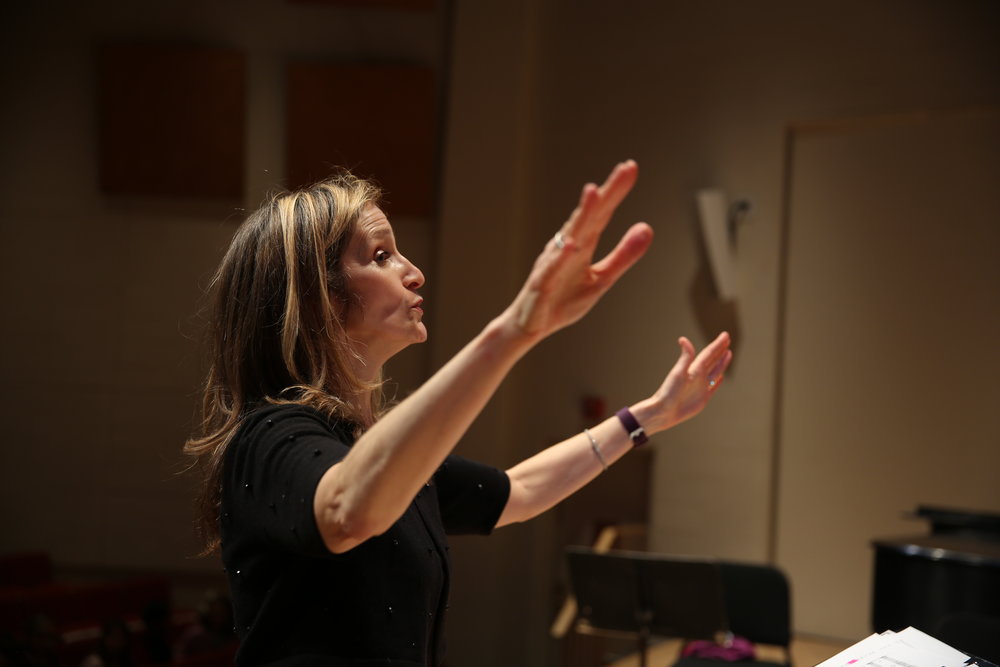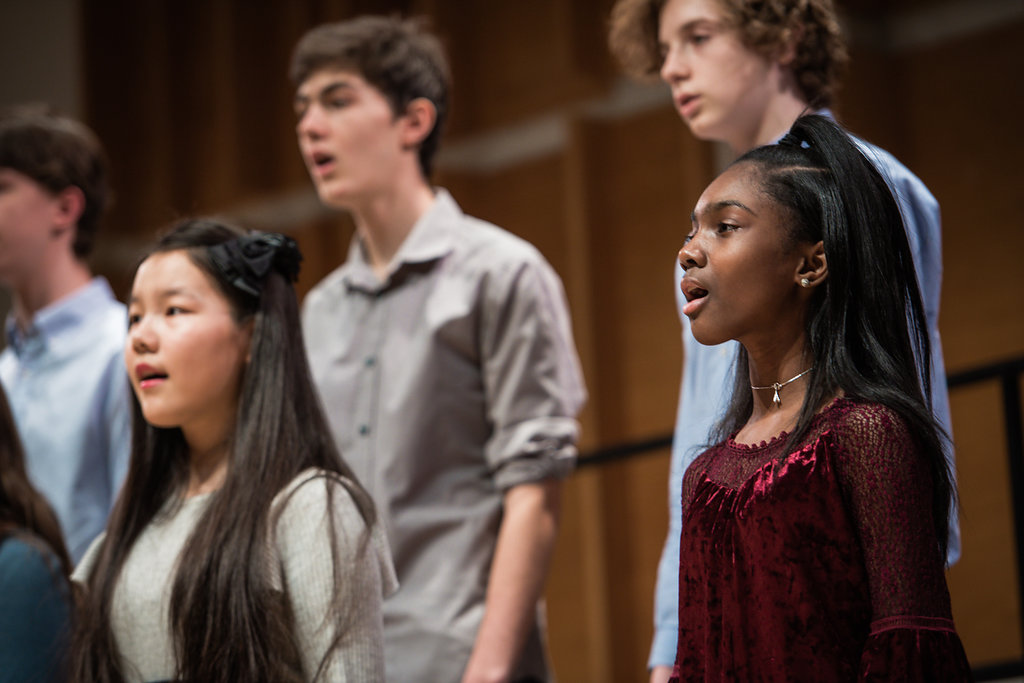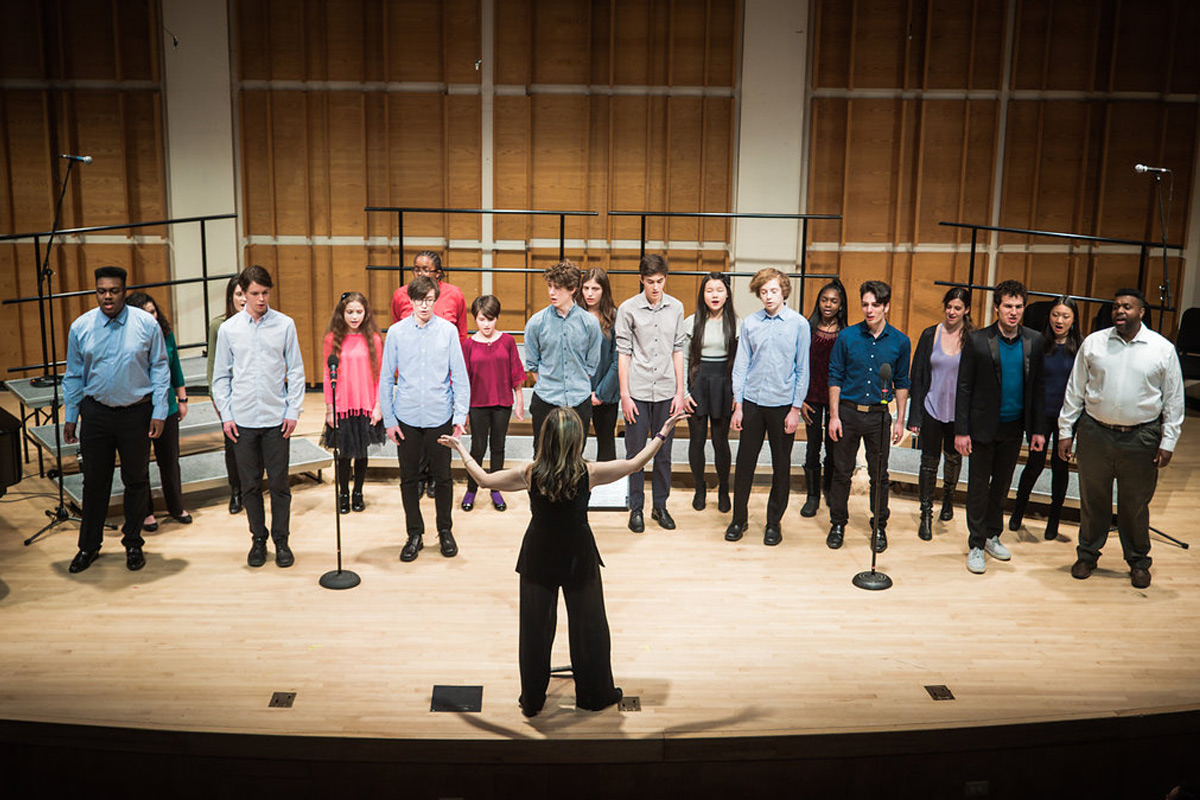“Some people say the eyes are the window to the soul,” says Jeanne Goffi-Fynn. “I say it’s the voice.”
Case in point: The painfully shy young man in the unique Vocal Workshops at TC for teens and pre-teens that Goffi-Fynn (Ed.D. ’96) launched this past year at Teachers College as an offshoot of the Every Voice Choirs, the TC-hosted youth ensembles created and directed by Nicole Becker (Ed.D. ’11).

THE ENABLER Goffi-Fynn helps young singers make their own musical choices.
“He pretty much didn’t say boo,” Goffi-Fynn says. “He has a terrific voice, but lacked the confidence to match it. Then, during our joint performance efforts with Every Voice Choirs, connecting our voices with social justice in honor of Martin Luther King's birthday, he asked if he could sing ‘My Shot’ [the pull-out-the-stops verbal dazzler from Hamilton]. Now he’s requesting solos all over the place. His mother didn’t know – I told her, you’ve got to come see this.”
Helping singers take ownership of their voices – and often, of their identities – is Goffi-Fynn’s focus in all of her work, from teaching in TC’s Music & Music Education program, where she directs doctoral students, to serving as a Singing Voice Specialist who seeks to help professionals prevent or repair injury. But it’s in the Workshops – created with a TC Provost’s investment grant (but still seeking donor support) – that Goffi-Fynn may be best realizing her vision.
“I’m always struck by what young people can bring to the table when you don’t shut them down too early – when you help them develop their own musicality and make their own musical choices.”
Jeanne Goffi-Fynn
“Music is very skills-based, a conservative pedagogy – think ‘conservatory,’” she says. “The outlook is typically, ‘get your skills together, then we’ll hear you.’ Lessons tend to be very master-apprentice. But I’m always struck by what young people can bring to the table when you don’t shut them down too early – when you help them develop their own musicality and make their own musical choices.”
To that end, Goffi-Fynn serves as equal parts as vocal instructor and life coach to the young people in her workshops, who range from aspiring stars to those who just want to sing. Her TC masters and doctoral students also work with the youngsters, providing instruction and serving as role models. “It’s great for the kids to work with our TC grad students, because then they can see what’s going to happen with their voices five or ten years down the road, and understand the process they need to go through. The more we do this type of instruction, the more I believe that mentoring is the most important thing we offer.”
Be a Vocal Supporter
If you like the sound of the Vocal Workshops, here’s your chance to voice it with a gift. While Jeanne Goffi-Fynn volunteers her time in running the workshops, and while TC provides free space, money is needed to:
- recompense TC students who lend their time and talents;
- provide tuition scholarships for program participants, most of whom come from public schools
- pay for the instrumentalists and lighting and recording technicians who work with the young singers when they perform.
So give now – and keep things humming – at:
https://www.tc.columbia.edu/singers
There are three workshops. One is for young men ages 11-17, meeting throughout the entire year, with a focus on music theatre in the spring. The group is gender-specific because male voices go through particularly pronounced changes during adolescence, but it is open to “transgender, non-binary, and non-gender conforming” singers – really, anyone seeking a comfort level with a lower-register voice.
“We’re very aware of gender issues, and I’m very open to anyone who connects with singing with young men,” Goffi-Fynn says. “It’s tricky, because there’s a physical side to gender. If you’re a trans boy taking hormones, that can change the voice, but if you’re not taking hormones, you’re still going to sing in a higher pitch. So we help some kids learn how to use their new voices, and others find material that’s in range for them, however narrow. In either instance, it’s about helping kids use their voices for what feels artistic and expressive for them, so they can develop repertoire and feel acknowledged and heard.”
Two other groups, which are open to everyone, also serve an 11-17 age group, and meet during the regular school year only. The fall semester is devoted to audition prep and the spring to music theater. Here, too, there’s plenty of crossing of traditional lines, with girls often singing lead male roles.
“Singing isn’t so much about physical strength as it is about coordination, which will vary with different style. There isn’t just a single way to make these different sounds. You need knowledge, flexible pedagogy, and an awareness of the age of the singer.”
Jeanne Goffi-Fynn
Goffi-Fynn, who combines a maestra’s diction and bearing with a disarming lack of pretension and a campy sense of humor, strikes a balance between honing core musical skills and having some improvisational fun. The groups practice calling back intervals and rhythm and singing solo; brave a mock audition night, with Goffi-Fynn’s friends from the worlds of Broadway and Lincoln Center in attendance; and perform classical material – this year’s spring concert included “Ombra Mai Fu” (“There Never Was a Shade”), the opening aria from Handel’s opera “Serse,” followed by a pop version of the same piece, with everyone wearing sunglasses.
But kids want to sing the music they listen to and know, and Goffi-Fynn helps them to explore their chosen material – “If it’s not a meaningful journey, who cares if you can sing? You have to sing about something” – and also navigate its physical challenges. “Pop is influencing more styles, including theater, and singers are singing at higher and higher intensity levels,” she says. “Kids are also starting younger, with less training. So there are more injuries. We help them sing the styles they want and avoid hurting themselves. Singing isn’t so much about physical strength as it is about coordination, which will vary with different style. There isn’t just a single way to make these different sounds. You need knowledge, flexible pedagogy, and an awareness of the age of the singer.” You need knowledge, flexible pedagogy, and an awareness of the age of the singer.”

FINDING THEIR RANGE The Workshops are set up to accommodate teens' changing voices and search for repertoire.
It’s challenging work, because adolescence is a time when egos and voices (both of which are still developing) are fragile. “Teens need a lot of reinforcement. Even the best-intentioned kind of criticism can shut them down, especially when it comes to singing, because their voices are physically a part of them. So we’re all about positivity.”
Goffi-Fynn’s understanding of personality – and personal equipment – as a driver in singing grows directly out of her own experiences. “My parents were quiet people” – her father was first-generation and a chemist, and her mother was a librarian – “and they looked at me like, ‘Where did you come from?’”
Still, with a very high soprano voice, Goffi-Fynn says, she was never a “belter” – and it was only when she discovered Gilbert & Sullivan operettas that she found her niche.
“The voice has places where it likes to hang out,” she says. “Everyone has to find theirs – like a runner choosing the right distance event.”
Even later on, after singing opera in Europe for a few years, she ran into some “technical difficulties” and ended up studying at the University of Colorado at Boulder with Barbara Doscher, author of The Functional Unity of the Singing Voice, who believed that singers and teachers alike needed to understand the anatomy and physiology of breathing, the acoustical laws that govern resonance, and other physical aspects of vocal production. She subsequently interned at Mount Sinai Medical Center’s Grabscheid Voice Center and trained at St. Luke-Roosevelt Hospital in the diagnosis and treatment of singing voice disorders. Along the way, she decided she wanted to teach and made her way to TC, where she earned her doctorate in Music Education. After having her own children, she became increasingly interested in working with younger students and launched a research project she called “Multiple Roles of Musician Mothers: A Circle of Fifths,” with TC faculty member Lori Custodero, who founded Jazz at Lincoln Center’s “WeBop!” program.
As part of that project, Goffi-Fynn kept a journal on the musical development of her then-infant son. As a classically trained singer, she might well have expected to call at least some of the shots in that process, but her son had other ideas.
“Even at six months, people have a way they want to work on things,” she recalls. “In a way, my son already knew himself better than I did. I could give him options, but he knew what he wanted to do. And I thought, ‘If my six-month-old already has such a strong sense of self, I’m doing too much for adult students. I need to let them come to the table and co-construct their own learning – because that’s what a creative teacher helps people do.”
